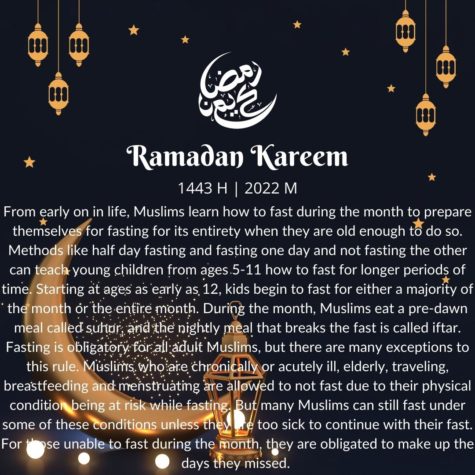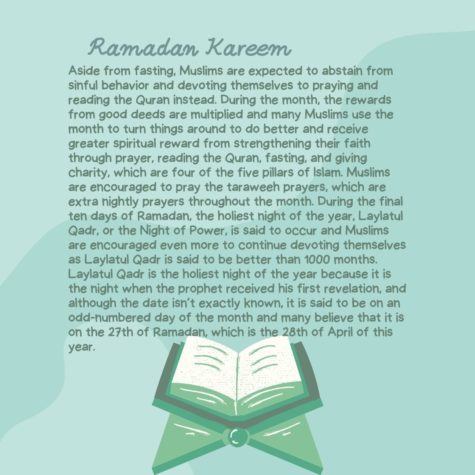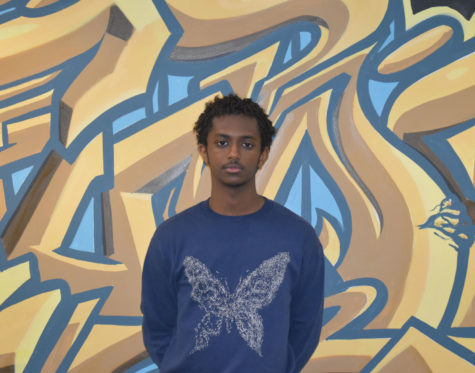OHS Muslim students celebrate Ramadan
Ramadan: The story of the holy month
Muslim students of OHS observing Ramadan in C-Plaza by not eating breakfast.
April 25, 2022
Muslims worldwide are observing the most important month of their year. Ramadan, the ninth month of the Islamic calendar, is the month where Muslims across the world fast from the sunrise prayer of Fajr to the sundown prayer of Maghrib. Between these two prayers, many Muslims abstain from eating food and drinking water. But Ramadan is much more than this. For many Muslims, their lives consist of a lifetime of observing the month and strengthening their deen, or faith, by reading the Quran, praying and breaking bad habits. For OHS, Muslim students now observe the month during school compared to previous years when it was in the summer because the date Ramadan begins and ends changes yearly.
Why Ramadan’s date changes every year
Throughout the years, the month of Ramadan begins and ends on different days. This is because the Islamic calendar is a lunar calendar compared to the solar Gregorian calendar, the calendar used across the world. The Islamic calendar, known as the Hijri calendar, is a calendar consisting of 354 or 355 days in the Islamic year and is used to determine the days of Islamic holidays, like Eid, the proper time for Hajj, or the Islamic pilgrimage to Mecca. The calendar is named after the Hijri era, when the Prophet Muhammad and his followers migrated from Mecca to Medina and made the first ummah, or Muslim community there. The event is known as the Hijrah and established the Islamic New Year in 622 CE. The current Islamic year is 1443 AH. However, across the world Muslims use both the Hijri calendar and Gregorian calendar, with the Hijri calendar being used for religious purposes and the other being used as the civil calendar.
The month of Ramadan is the holiest month of the Islamic year because it commemorates the prophet Muhammad’s first divine revelation. When the prophet was 40 lunar years old, the angel Jibril, known as Gabriel in English, visited him in a cave near Mecca called Hira. Jibril ordered the prophet to read, to which the prophet replied that he could not read since he didn’t know how. Jibril then proceeded to hold Muhammad and embrace him. This happened two more times until Jibril recited the first lines from chapter 96 of the Quran. After the revelation, he went back to Mecca and was consoled by his first wife Khadija, who took him to her cousin who was a Christian. After prophet Muhammad told her cousin what happened, her cousin said that it was a revelation from Allah and testified to his prophethood. From then on, the prophet Muhammad would live to spread Islam to his people and continue to receive these revelations and verses from the Quran until his death.
Students’ Favorite Parts of Ramadan
There are many aspects of the month of Ramadan and Muslims enjoy the month for many different reasons of importance to them. The significance of Ramadan in the life of a Muslim is massive as it teaches Muslims many lessons and values to live by as a Muslim and as a human being. OHS Staff member Ms. Fathia Ali said, “Ramadan teaches Muslims how to behave and be kind to each other. It teaches us how to understand how people who don’t have anything live and how to feel for them. Because during Ramadan, you are fasting the whole day, so imagine you don’t have anything for the whole year. When you are fasting you learn how to see from the other person’s perspective.”
Muslims across the world value the month strongly and think of the many aspects of Ramadan highly. Senior Ayman Mohamed said, “When I think of Ramadan, I think of a blessed month where our holy book, the Quran, was sent down. A month of mercy, cure, goodness and forgiveness. We use this month to practice self-restraint and get closer to God.” One of the many values of Ramadan that Muslims hold close to them is the togetherness between them and others. Mohamed also said, “My favorite thing about the month of Ramadan is being closer to family. During the month of Ramadan, we are surrounded by family and friends. This brings so much more joy to the month.”

What fasting mean to Muslims
Fasting during the month teaches many Muslims self-discipline, empathy and sacrifice as to help themselves be closer to Allah and be better people. For some, it can start with observing the month and using it to help break their bad habits. OHS Senior Liban Mohamed said, “Ramadan is all about switching your bad habits with good habits. Ramadan has helped me exponentially with this.” At the end of the month, Muslims often feel better than they did before the month. Ayman said, “After the month is over, I feel at peace and my body feels cleansed.” The result of Ramadan is a feeling of being cleansed and ready to change. Liban said, “You feel like a completely different person physically, mentally and spiritually.” Ramadan teaches empathy for people who are not as fortunate, and the hardships of living without eating or drinking as much as we like. This understanding of learning empathy through sacrificing a big part of Muslim lives for the sake of Allah builds character for Muslims across the world.

The month of Ramadan is not just a month where Muslims fast. Ramadan is a sacred month that is held as one of the five pillars of Islam along with praying five times a day, giving charity to the poor, pilgrimage to Hajj during the lifetime of a Muslim and the declaration of faith that there is no god but Allah and that Muhammad is his messenger.
Non-Muslims should understand that this month has high religious significance and is not something that can be observed for personal gains like weight loss, although fasting for the month has health benefits. Liban said, “What non-Muslims should understand about the month of Ramadan is that fasting is not just limited to food and water, but also abstaining from smoking, sexual activity and swearing whether it’s at someone or out of anger. Ramadan is about the mindset.”
Ramadan constantly teaches Muslims how to be better people and how to develop an understanding and empathetic mind. Ayman said, “The month isn’t just about fasting, it’s to develop positive habits that can be brought forward once Ramadan is over.” But more than anything, Ramadan is a special month for Muslims. Ms. Ali said, “This is a month to become closer to Allah and look for forgiveness.” The Ramadan month ends on May 2, after it ends, Muslims across the world will celebrate the three days of Eid.



